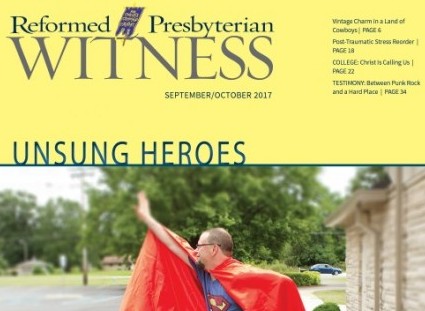You have free articles remaining this month.
Subscribe to the RP Witness for full access to new articles and the complete archives.
There are a lot of invisible things in the visible church. When we think of a particular congregation, we might think about the impact of its key ministries. We might remember how we have been blessed or even transformed through the pastor’s sermons.
But most of the work of that church occurs beyond our seeing. There are the counseling sessions that save a marriage. The daily meals delivered to a family with a new baby that remind them they are not alone. The Sunday school teacher’s quiet testimony of the love of a heavenly Father for His young children. The one-to-one Bible study that helps open the Word to a new Christian. The anonymous gift that keeps a family’s heat and lights on.
This issue of the magazine talks about leadership in the visible church, particularly that which is less visible. Perhaps you are a Bible study leader, nursery coordinator, building manager, meal coordinator, or teacher. How do you encourage other saints in their gifts and purpose? How do you recruit for important and necessary tasks in the church, while keeping a ministry focus rather than applying guilt-tripping pressure? The article on page 8 supplies some helpful guidance.
Among the less visible leaders in a church are the deacons and ruling elders. They lead in their given areas of authority, but those efforts are volunteer efforts, juggled with their full-time commitments to work and family.
Some have questioned the RPCNA doctrine of including women as deacons, given scriptures that teach that a woman should not exercise authority over a man. We will address that question in this issue, along with the interesting history of women deacons in the denomination.
The authority question is often the first one raised by people from sister denominations. But the question can never be, Does a person have authority? since every believer has authority from Christ Himself over given areas. Even a child is given authority in limited areas, and certainly adults far more. The question is not, Do you have authority? but, From whence is your authority, and what sort of authority is it? The article on page 14 addresses this.
A recent issue regarding another group of volunteer leaders—ruling elders—has been studied by the RPCNA Synod for several years. I’m glad to say that this focus has so far produced greater participation of ruling elders at the Synod meeting. The article from Synod’s committee on ruling-elder participation (Elders in the RPCNA) highlights the importance of ruling elders and the challenges they face.
We hope this issue encourages many unsung people in the church. Encouraging one another and building up one another are part of our calling from Christ. That should extend to the pastor (Christ Is Calling Us) and other leaders and to the weakest and youngest and least spiritually mature.
